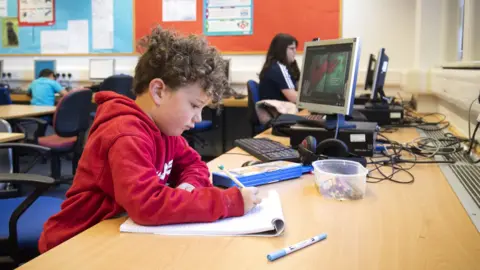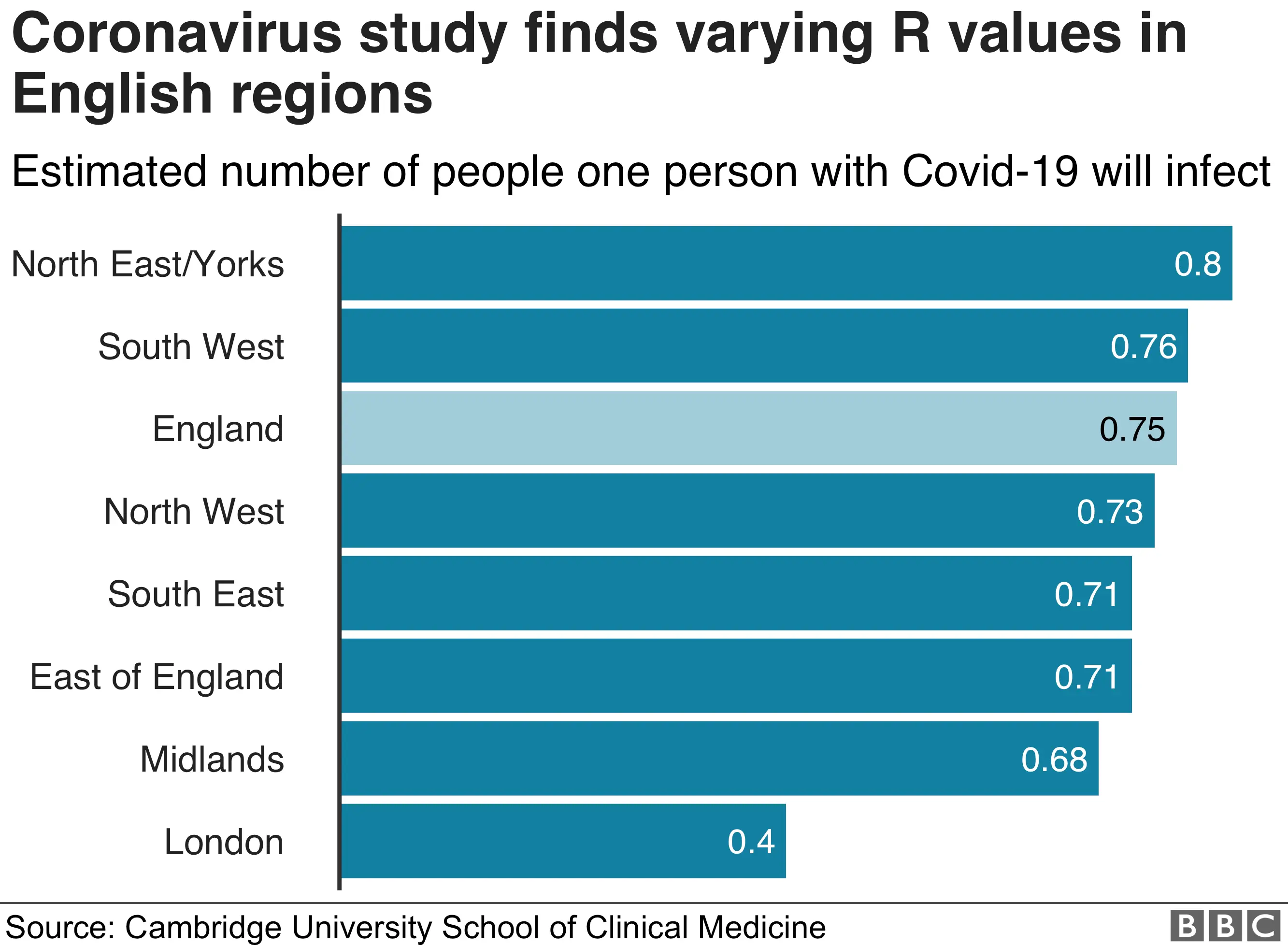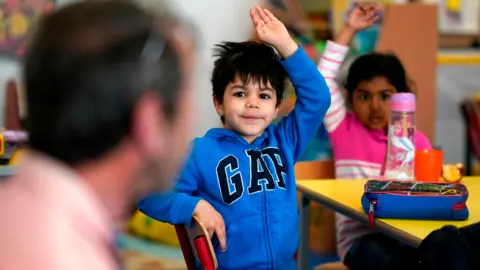Coronavirus: More councils warn over opening schools on 1 June
 PA Media
PA MediaMore than 35 councils in England have warned that not all of their primary schools will be ready to reopen on 1 June.
Some of them have expressed opposition to opening at all amid safety concerns.
The government says it will listen to the concerns of parents and teachers about the plans to reopen schools.
At the daily No 10 briefing, Culture Secretary Oliver Dowden said the move would only go ahead if ministers "can be sure of children's safety".
He also said he wanted schools in England to return at the same time, after his cabinet colleague Justice Secretary Robert Buckland told BBC Breakfast there may not be a "uniform approach".
Mr Dowden said: "It is best, and the government has said this repeatedly, that we move as a whole nation, and that would include of course the whole of England in doing so."
But he suggested there could be different measures in "micro-hotspots" where there was an outbreak of new coronavirus cases.
Earlier, teaching union NASUWT said it remained "unconvinced" reopening schools was "appropriate or practicable".
For most pupils, schools have been closed since 20 March.
From 1 June, children in Reception, Year 1 and Year 6 in England will be able to return to school if infection rates and the government's other tests at the time allow it. England is the only UK nation to set a return date so far.
Schools in Wales will not reopen on 1 June, while those in Scotland and Northern Ireland may not restart before the summer holidays.
But on Tuesday, Calderdale Council, in West Yorkshire, followed Bury, Liverpool and Hartlepool in advising its schools against wider reopening.
Other local authorities expressed concern:
- Conservative-led Solihull Council warned some school places may not be ready for the first week of June
- Manchester Council said its schools will have to "work at their own pace" to gradually increase numbers
- Birmingham City Council said it may not be possible for some schools to safely open to more pupils by 1 June
- Leeds City Council said it would not expect all its schools to reopen to all pupils "from day one"
- Stockport Council said its schools would not open until 10 June
- Slough Borough Council said schools would not welcome more pupils until 8 June at the earliest
- Brighton and Hove City Council said it had advised schools only to reopen when risk assessments indicated it is "safe to do so".
A number of the 153 English local authorities have acknowledged safety concerns but have not urged all their schools to reject the proposed timeframe.
Academies have the freedom to make their own decision, unlike the two thirds of primary schools supported by local authorities.

Analysis by Leila Nathoo, BBC Political Correspondent
The government's plan to reopen primary schools to some year groups was a key part of the strategy for getting the country to take the next steps out of lockdown. But it's run into fierce opposition.
Persuading people that it's safe to begin thinking about the path back towards normality was always going to be a challenge.
And Downing Street is stressing that 1 June was only put forward as the earliest possible date for any reopening of schools (and non-essential retail, set for the same day) - conditional on the five tests for controlling the virus being met.
But the admission from cabinet minister Robert Buckland that the picture across the country might not be "uniform" - is a reminder that the government in Westminster is not ultimately in control of what happens in schools across the country next month.
And it's problematic for ministers that a key date for adjustment to restrictions - albeit one that came with caveats - is now in question.
There is already variation between the nations on when schools will return - now there's likely to be differences across England too.

Emma Knights, the chief executive of the National Governance Association, which advises school governors, told the BBC it would be hard for governors to ignore the position of their local authorities.
She said as councils might be legally judged the employers of school staff, governors would need a very strong reason to make a different decision.
The decision to begin reopening schools came after the reproduction, or R number - the number of people that one infected person will pass the virus on to, on average - came down across every part of the UK.
But multiple research groups, including those at the University of Cambridge, show it varies across the country - it has come down most in London but is higher in the north-east of England.

Metro mayors in the north-west of England have made an "urgent" call for the release of regional Covid-19 reproduction rate figures, saying it would help residents making "informed decisions about the risk and help decide whether they wish to take a more cautious approach to the relaxation of the lockdown rules".
Meanwhile, a survey of 29,000 members of the teachers' union NASUWT found just one in 20 thought it would be safe for more pupils to return next month.
Patrick Roach, the union's general secretary, called for all the scientific evidence from the government's Scientific Advisory Group for Emergencies (Sage) to be made available to teachers and schools as soon as possible.

- RISK AT WORK: How exposed is your job?
- SCHOOLS: When will children be returning?
- EXERCISE: What are the guidelines on getting out?
- THE R NUMBER: What it means and why it matters
- RECOVERY: How long does it take to get better?


What do parents think?
Mother-of-three Amy Hughes says her eldest daughter is eligible to return to school on 1 June, but she will not send her back then.
"We're actually waiting to see if there's a second wave to decide whether to let our other daughter start school in September," she adds.
She moved her family out of inner city Bristol last year when one of her daughters caught a virus that made her lungs collapse.
Ms Hughes, who now lives in Lincolnshire with her children aged six, four and one, says the experience had made her "hyper sensitive about viruses".
Lincolnshire GP Grace Hurdley, who is currently on maternity leave, says although school life will be "different", sending her five-year-old son back on 1 June is "the best thing" for him.
While home schooling has not been a problem, she told BBC Radio 5 Live her son was "really struggling" spending so long at home.
Ms Hurdley believes it would be "better for him to play alongside his friends than to continue being isolated".
She is reassured by plans to split his usual class size of 30 into 15, so that he is in a "bubble" with some other children and his teacher, with their own meal and play times.
He would also get used to washing his hands more regularly - a habit she says the family are "very keen on at home" in light of their new baby and the pandemic.

'Acceptable level of risk'
Dr Peter English from the doctors' union, the British Medical Association, said in the Daily Telegraph that schools should reopen "as soon as it is safe to do so", but warned "a zero-risk approach is not possible".
 Getty Images
Getty ImagesAttendance by primary school pupils will be voluntary and schools are reporting varied levels of interest from the parents.
Secondary schools are likely to stay closed until September but the government hopes those facing exams next year - Years 10 and 12 - will get some time in school before the summer holidays.
A Department for Education spokeswoman said: "We want children back in schools as soon as possible, because being with their teachers and friends is so important for their education and their wellbeing.
She insisted plans for the "cautious" return of some pupils from 1 June are "based on the best scientific and medical advice" and said No 10 had "engaged closely" with relevant groups including the unions, and will continue to do so.
In other developments:
- Consumers "may never shop the same way again" following the coronavirus crisis, the boss of Marks and Spencer has said. It came as the retailer said clothing and homeware sales had fallen by 75% in the six weeks to 9 May
- Aerospace giant Rolls-Royce has announced it will cut 9,000 jobs across the firm
- Outsourcing firm Serco has apologised after accidentally sharing the email addresses of almost 300 contact tracers
- Captain Tom Moore said he was "overawed" on finding out he was to be awarded a knighthood for his fundraising efforts

- LOUIS THEROUX: The 15 songs getting him through lockdown
- FAKE-AWAY: The best fast food recipes you can make at home

